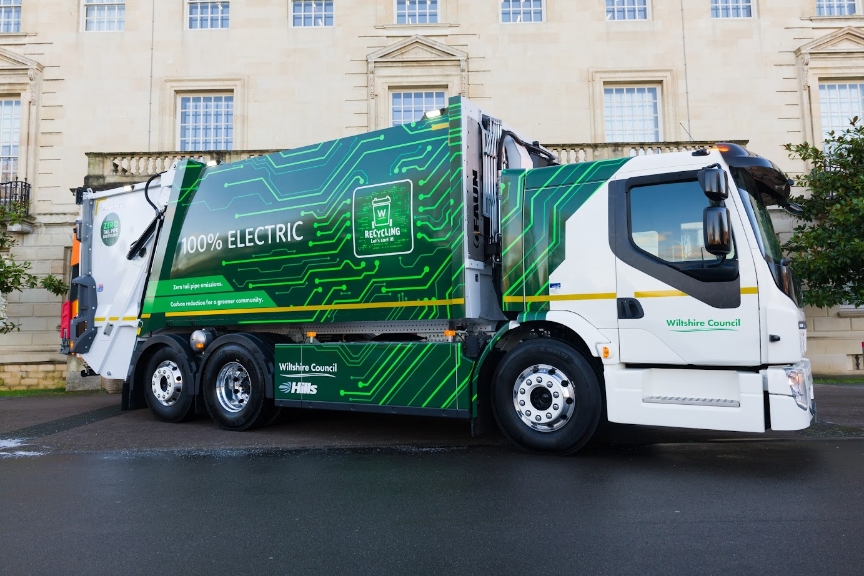In a significant step towards sustainability, Wiltshire Council has launched a trial of a 100% electric Refuse Collection Vehicle (eRCV) designed to modernise its waste collection fleet and reduce carbon emissions.
 The initiative, in collaboration with Hills Group, aims to evaluate the performance of this cutting-edge vehicle in real operational settings across Wiltshire.
The initiative, in collaboration with Hills Group, aims to evaluate the performance of this cutting-edge vehicle in real operational settings across Wiltshire.
The trial commenced this month and will initially focus on urban areas, including Calne and Chippenham, before expanding to the city of Salisbury.
The Volvo FE Low Entry Cab eRCV will be deployed at various operating depots and assigned to household waste collection routes. As the trial progresses, it will assess the vehicle’s efficiency in semi-urban, semi-rural, and primarily rural collection rounds.
Cllr Dominic Muns, Cabinet Member for Waste and Environment, expressed enthusiasm for this initiative, stating: “This is an exciting collaboration with Volvo Trucks, which has a wealth of experience in the electric vehicle market. The 100% electric RCV contributes to cleaner air as it does not produce exhaust gas. This trial brings us a step closer to achieving our mission to modernise the council's waste collection fleet to low-carbon vehicles and ultimately to reduce carbon emissions."
The trial aims to establish a realistic percentage of collection routes that could be serviced by electric vehicles, providing invaluable data for future procurement decisions regarding waste collection fleets.
“We can't wait to see it on the road soon throughout our communities across the county,” Cllr Muns added.
Ed Dodd, Deputy Chief Executive of Hills Group, echoed this sentiment, stating: “We are excited to support Wiltshire Council's carbon-neutral mission with the trial of the Volvo 100% electric RCV. Our crews are looking forward to testing the eRCV across a variety of collection routes in the county. It is another example of our commitment to operating sustainably."
The eRCV is also equipped with TRAILAR solar panels on its roof, enhancing its sustainability by supporting the power requirements of the cab.
Adam Buckley-Mayes, Principal Engineer at TRAILAR, noted: “The benefits of adding solar to the eRCV include extended vehicle range, reduced charging time, and proactive battery maintenance, as well as powering all the onboard electrical equipment, thereby lessening the demands on the vehicle's battery.”
Amy Stokes, Head of e-Mobility at Volvo Trucks UK & Ireland, stated: "Our electric technology is designed to deliver performance, efficiency, and environmental benefits. This partnership with Wiltshire Council and Hills Group allows us to bring those advantages to life. We're eager to demonstrate how electric trucks can meet the demands of diverse operating environments, from urban areas to rural rounds."
Want to know what’s on in Calne? Visit our local events page for listings and to find out how to add your own events for free. Follow us on Facebook, Twitter and Instagram to keep up with all the latest news. Have you got a story for us? Email editor@calnenews.com.



